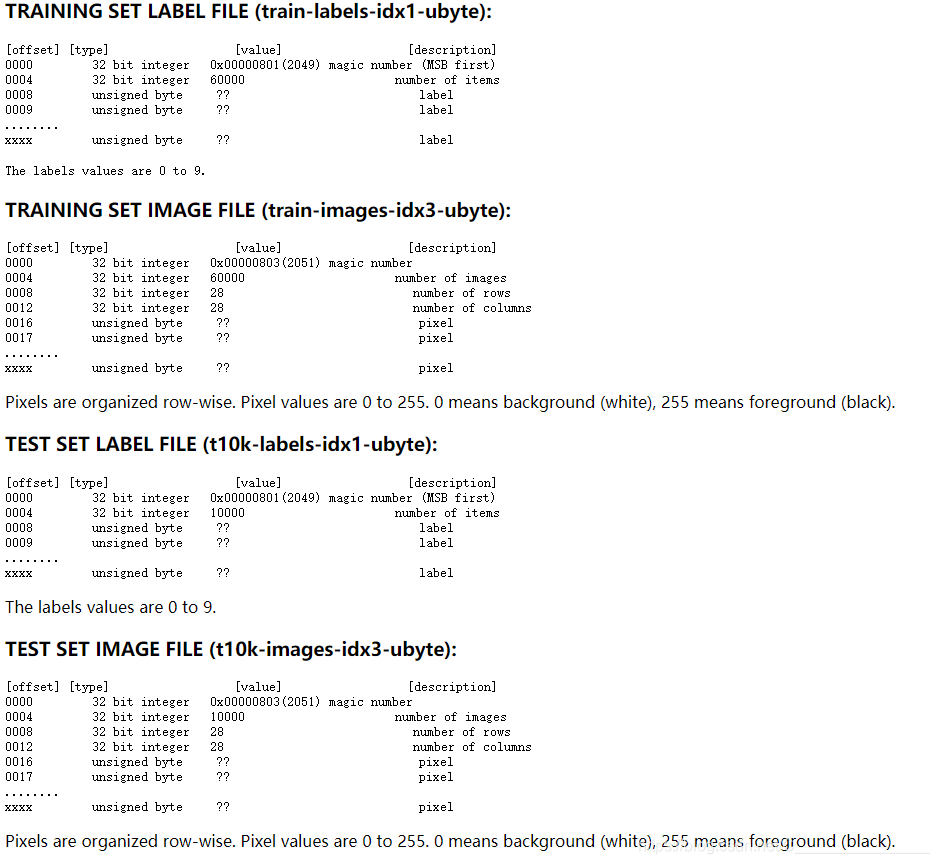C++基於文件流和armadillo讀取mnist
- 2021 年 5 月 9 日
- 筆記
發現網上大把都是用python讀取mnist的,用C++大都是用opencv讀取的,但我不怎麼用opencv,因此自己摸索了個使用文件流讀取mnist的方法,armadillo僅作為儲存矩陣的一種方式。
1. mnist文件
首先避坑,這些文件要解壓。

官網截圖可知,文件頭很簡單,只有若干個32位整數,MSB,像素和標籤均是無符號位元組(即unsigned char)可以先讀取文件頭,再讀取剩下的部分。
2. 讀取文件頭
我覺得沒什麼必要啊,直接跳過不行嗎
文件頭都是32位,那就整四個unsigned char唄。
uchar a, b, c, d;
File >> a >> b >> c >> d;
這樣a、b、c、d就保存了一個整數。
x = ((((a * 256) + b) * 256) + c) * 256 + d;
然後就得到了唄。
看每個文件有多少文件頭,就操作幾次(並可以順便與官方的magic number進行對比),剩下的就是文件的內容了。
3. 讀取內容
這部分可以依照之前的方法,一次讀取一個字元,再保存至矩陣當中。例如:
uchar a;
mat image(28, 28, fill::zeros); // 這是個矩陣!
for(int i = 0; i < 28; i++) //28行28列的影像懶得改了
for(int j = 0; j < 28; j++)
{
File >> a;
image(i, j) = double(a);
}
這樣就讀取了一張圖片。其餘以此類推吧。
4. 完整程式碼
可以複製,可以修改,也可以用於商用和學術,但是請標註原作者(就是我)。
mnist.h
#ifndef MNIST_H
#define MNIST_H
#include<iostream>
#include<fstream>
#include<armadillo>
#define uchar unsigned char
using namespace std;
using namespace arma;
//小端存儲轉換
int reverseInt(uchar a, uchar b, uchar c, uchar d);
//讀取image數據集資訊
mat read_mnist_image(const string fileName);
//讀取label數據集資訊
mat read_mnist_label(const string fileName);
#endif
mnist.cpp
//mnist.cpp
//作者:C艹
#include "mnist.h"
int reverseInt(uchar a, uchar b, uchar c, uchar d)
{
return ((((a * 256) + b) * 256) + c) * 256 + d;
}
mat read_mnist_image(const string fileName)
{
fstream File;
mat image;
File.open(fileName);
if (!File.is_open()) // cannot open file
{
cout << "文件打不開啊" << endl;
return mat(0, 0, fill::zeros);
}
uchar a, b, c, d;
File >> a >> b >> c >> d;
int magic = reverseInt(a, b, c, d);
if (magic != 2051) //magic number wrong
{
cout << magic;
return mat(0, 0, fill::zeros);
}
File >> a >> b >> c >> d;
int num_img = reverseInt(a, b, c, d);
File >> a >> b >> c >> d;
int num_row = reverseInt(a, b, c, d);
File >> a >> b >> c >> d;
int num_col = reverseInt(a, b, c, d);
// 文件頭讀取完畢
image = mat(num_img, num_col * num_row, fill::zeros);
for(int i = 0; i < num_img; i++)
for (int j = 0; j < num_col * num_row; j++)
{
File >> a;
image(i, j) = double(a);
}
return image;
}
mat read_mnist_label(const string fileName)
{
fstream File;
mat label;
File.open(fileName);
if (!File.is_open()) // cannot open file
{
cout << "文件打不開啊" << endl;
return mat(0, 0, fill::zeros);
}
uchar a, b, c, d;
File >> a >> b >> c >> d;
int magic = reverseInt(a, b, c, d);
if (magic != 2051) //magic number wrong
{
cout << magic;
return mat(0, 0, fill::zeros);
}
File >> a >> b >> c >> d;
int num_lab = reverseInt(a, b, c, d);
// 文件頭讀取完畢
label = mat(num_lab, 10, fill::zeros);
for (int i = 0; i < num_lab; i++)
{
File >> a;
label(i, int(a)) = 1;
}
return label;
}


